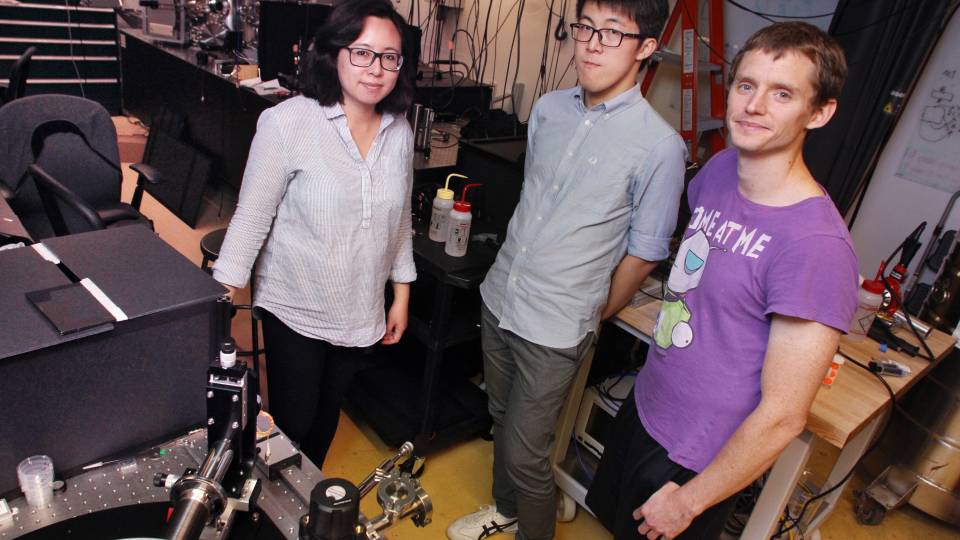Nathalie de Leon, Julia Mikhailova, Barry Rand, and Jeff Thompson
Four Princeton University researchers — Nathalie de Leon, Julia Mikhailova, Barry Rand and Jeff Thompson — are among the 21 winners of the 2023 Gordon and Betty Moore Foundation Experimental Physics Investigators Initiative awards. The grants will support research into quantum computing, advanced solar cells and laser-based sensing technologies, as well as efforts to foster inclusive research communities.
The award carries with it a $1,250,000 grant to each recipient, distributed over the next five years, to "advance the scientific frontier in experimental physics," the foundation said in its announcement.
Nathalie de Leon
De Leon, associate professor of electrical and computer engineering, has pioneered the use of diamond as a platform for quantum information technologies. Since her 2016 arrival at Princeton, de Leon has identified a new color center in diamond that combined long spin coherence times with excellent optical properties, an outstanding problem in the field of quantum networks. She has also developed new techniques to use nitrogen-based diamond color centers for nanoscale quantum sensing, and she is working on new techniques for bulk quantum diamond growth in collaboration with the Princeton Plasma Physics Laboratory.
More broadly, her group works at the interface of many fields — including quantum optics, atomic physics, condensed matter and device physics, materials science, surface spectroscopy, nanofabrication, and spin physics — to uncover sources of noise and loss in quantum systems and design new quantum platforms. Most recently, these efforts have led to the development of a new superconducting qubit based on tantalum that achieved world-record coherence.
De Leon's previous honors include a Rolf Landauer and Charles H. Bennett Award in Quantum Computing from the American Physical Society, an Early Career Award from the U.S. Department of Energy (DOE), a Defense Advanced Research Projects Agency (DARPA) Young Faculty Award, an Air Force Office of Scientific Research Young Investigator Award, a National Science Foundation CAREER Award and a Sloan Research Fellowship in physics. She came to Princeton in 2016.
Julia Mikhailova
Mikhailova, associate professor of mechanical and aerospace engineering, investigates optical harmonic generation in plasmas and solids and develops new ionization-based optical components. Optical harmonics can serve as a diagnostic tool for high-energy-density plasmas and new quantum materials, as well as a source of intense ultrafast X-ray radiation that can be used to produce entangled X-ray light for quantum metrology.
Mikhailova’s previous honors include a DOE Early Career Award, an Alfred Rheinstein Faculty Award for excellence in teaching and scholarship from Princeton, and an Alexander von Humbolt Research Fellowship. In 2021, she was named a Kavli Frontiers of Science Fellow of the National Academy of Sciences. She joined Princeton in 2013.
Barry Rand
Rand, professor of electrical and computer engineering and the Andlinger Center for Energy and the Environment, investigates the optical and electrical properties of thin film materials to usher in the next generation of thin film devices. His group has uncovered new ways to understand energy loss in organic solar cells, discovered the key to managing heat in metal halide perovskite LEDs, and developed a novel technique that allows nanoparticles to self-assemble for more efficient, stable and durable perovskite LEDs.
Previous honors include a DARPA Young Faculty Award, a 3M Nontenured Faculty Award, a DuPont Young Professor Award and a Young Investigator Program award from the Office of Naval Research. A 2007 Ph.D. graduate of Princeton, he joined the Princeton faculty in 2013.
Jeff Thompson
Thompson, associate professor of electrical and computer engineering, is an experimental atomic physicist exploring novel approaches to quantum computing and communication. One line of work, based on ytterbium atoms in optical tweezer arrays, has proven useful in quantum error correction, a key hurdle in the quest to build quantum computers at a practical scale. Another system, based on erbium ions in the solid state, shows promise as a way to connect quantum information systems in low-loss networks over optical fiber.
Thompson’s previous honors include a New Horizons in Physics Prize from the Breakthrough Foundation, a Presidential Early Career Award for Scientists and Engineers from the Army Research Office, a CAREER Award from the National Science Foundation, and a Sloan Research Fellowship in Physics. He joined Princeton in 2016.







